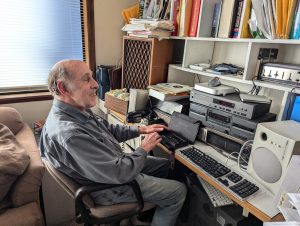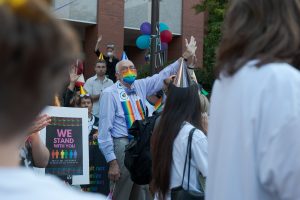Mixed experiences of LGBTQ+ students on campus
BIPOC, trans students encounter underlying culture of discomfort around LGBTQ+ people
June 4, 2020

Freshman psychology major John Nguyen has noticed a significant difference in how open they can be on campus compared to their high school. Their high school was primarily people of color.
At their old school, Nguyen felt free to be expressive about their identity, but this changed when they came to Seattle Pacific University.
“It’s been sort of hard because of the whole culture shock of having this space where I could almost do everything I want in terms of expressing my identity to this place, that puts me a little bit in a bottle,” Nguyen said in an interview over Zoom. “I feel like, at times, I have to rein it in but I’m not necessarily a 100% different person.”
Nguyen has noticed a different, more underlying culture of discomfort around LGBTQ+ people and issues on campus.
“I haven’t really met anyone who will outwardly say anything to me, but I have had more than one uncomfortable stare and, unfortunately, I am not an unnoticeable person,” Nguyen said. “I am probably the first person you’d notice. I jump around a lot. I’m very energetic and not very masculine-presenting.”
While campus might be different from the past, many LGBTQ+ students experience alienation both due to the actions of their peers and school policy. At the same time, though, these students still long for the reconciliation the school preaches.
The negative experiences for LGBTQ+ students feel subtle, almost completely positive for some, but blatantly harmful for others.
On the positive end is junior philosophy major Tally Scott. Scott is the president of Haven and identifies as bisexual. She has found an accepting environment within her major of philosophy where sexuality and gender are often a topic of conversation.
“From the spheres I’m in, it is very positive. I think that has to do with the fact that I’m a philosophy major and philosophy majors and faculty are very open-minded and accepting,” Scott said in an interview over Zoom.
Since her time here, Scott has noticed more students, faculty and staff making efforts to make LGBTQ+ students feel welcome — for example, by including their pronouns in their emails and name tags at events.
She is happy to see pride flags in students’ dorm room windows. She feels accepted when she tells her peers she is the president of Haven. She has found like-minded individuals in Haven to share their experiences and discuss issues facing the LGBTQ+ community.
When she brought her girlfriend at the time to campus, no one seemed to care or notice them.
Scott realized, though, that her experiences are different because of what she called being “straight-passing,” which she thinks has made it easier for her.
“I do realize I have a certain privilege. I am a cisgender female,” Scott said. “I’m ‘straight passing,’ is what you call it, because I am LGBT in that this doesn’t take away from that fact, but the fact that I like both genders instead of just the same definitely makes it a little bit easier for me in some areas.”
Unlike Scott, freshman sociology and criminal justice major Yeudiel Flores is not straight-presenting. He often wears more feminine clothing and is not afraid to fully express himself. He notices that people often stare at him.
“It feels like ‘Am I weird? Is this even appropriate?’ I have those kinds of questions in my mind,” Flores said in a Zoom interview.
This led to Flores feeling he must tone himself down in order to avoid those situations. All of this in an effort to dampen the feeling of waiting for the homophobia he has heard many LGBTQ+ face around the country.
“It is still behind my head. It lingers that feeling ‘Oh, when am I going to get that experience that everyone ultimately gets: getting judged,’” Flores said.
On the more blatant end of the spectrum, sophomore social justice and cultural studies major Charis Doi often posts on her social media advocating for LGBTQ+ students on campus and has been open about her bisexuality.
While being open has allowed her to be able to connect with LGBTQ+ students on campus, she has been called vulgar slurs in messages, even by people she had social justice classes with.
As a result of these experiences, she has met with various staff members about the hateful comments, while also trying to seek action to change the policies on campus like the Statement on Human Sexuality, SPU Bias policy and anti-discrimination policy.
This is due to the nature of the statements not being openly affirming of LGBTQ+ students while also including language that, to Doi, demonstrate values that seem to conflict with the school’s overall message of accepting marginalized people.
“It positions SPU kind of in this neutral, tiptoeing area,” Doi said in a Zoom interview.
As an Asian-American student, Doi feels that, oftentimes, Black, Indigenous and People of Color within the LGBTQ+ community are overlooked in classroom discussions on LGBTQ+ issues and in the LGBTQ+ community on campus.
“I know that the faculty always take into consideration the opinions of the white people in the community rather than the BIPOC people. We are always the last to get our voice on the table,” Doi said.
Sophomore communications major Alex Turner feels like he has to teach those who are not educated on LGBTQ+ issues and say offensive statements, even if they did not mean to. Turner finds this frustrating.
“They think they are not being offensive in any way, shape or form, but sometimes they didn’t know that they didn’t do their research,” Turner said in an interview over Zoom. “They are for LGBT rights, but when they are discussing it in person or in class, they don’t know how to connect lines and say something offensive.”
In the spaces he is in, Turner has to be an educator on LGBTQ+ issues because he is transgender. It is aggravating, especially when people will go up to his friends to ask questions on LGBTQ+ issues instead of doing their own research.
“I feel like I shouldn’t be in that position at all. I think every person should do their research and, if you are for LGBT rights, do your research and discover what not to say,” Turner said.
Turner also struggled with SPU housing when he enrolled as a freshman.
Housing wanted to use Turner’s birth name on the door and release it when doing roommate assignments, which made him uncomfortable. As a result, he felt he had no choice but to rush to get his name changed legally in three weeks, which is, historically, a painstakingly long and tedious process.
Turner was told he could only live in a single out of precaution for his safety.
“They wouldn’t let me do a double or have a roommate because they were afraid I would get a bad roommate and someone who was homophobic or transphobic or racist or something,” Turner said.
“When they said that, it was kind of a shock. If you are aware you have a lot of racist, homophobic or transphobic people at your campus and you are afraid one of them is going to get stuck with one of your ten trans students, you are taken aback.”
But his turmoil with dormitory life did not stop there.
Turner wanted to host a gay meetup in Emerson. He created posters and started to advertise around the hall. The other men on his floor, though, started messing with the posters. What was supposed to be an act of trying to get both out and closeted individuals in the hall together turned into an opportunity for people to undermine his attempt at creating a space for LGBTQ+ students.
Turner, like many other students interviewed, emphasized the need to reform the Statement on Human Sexuality. While he recognizes the difficulty of the situation the SPU administration is under, it still hurts LGBTQ+ students.
While the administration does not necessarily prevent LGBTQ+ students from being open on campus, it’s policies do lead to feelings of exclusion in a community that already is subject to negative experiences like homophobia, transphobia, exclusion of BIPOC people and misunderstanding from their non-LGBTQ+ classmates.
“When you’re part of those four words it means a lot more,” Turner said. “You are singled out in this huge handbook of like 20,000 words. You have four words that specifically say, ‘Hey SPU doesn’t like you.’ It rubs you the wrong way.”
On their Instagram, Nguyen opened up about an experience on campus that made them feel on edge.
They walked in one day to the CIS Help Desk trying to get help for a computer problem, wearing fishnets and jean shorts.
Nguyen was told to sit down as staff began to talk quietly and look up at them. After a while, a girl came to assist him. When another student came in a few minutes later, she was immediately helped by one of the men on staff.
Nguyen felt uneasy. From what they saw, there was a distinct difference between how Nguyen as an openly nonbinary and gay student, and the other, straight-passing student was treated.
That’s what seems to be the tricky thing for life as an LGBTQ+ student at SPU. It is a mixed bag.
Some students have positive experiences while others, including BIPOC, transgender and gender-nonconforming individuals, still face issues of homophobia and transphobia. Meanwhile white, straight-presenting tend to experience these things to a lesser degree.
“I’m not actively thinking about it,” Nguyen said. “It’s just ‘cause I already know I’m not going to think about it too much, but also, at the same time, it is obviously bothering me.”

























































































